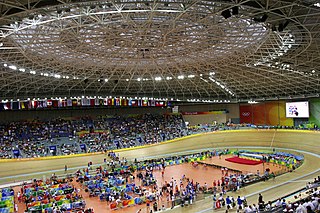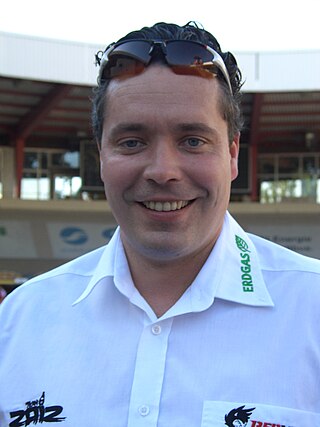The individual pursuit is a track cycling event where two cyclists begin the race from a stationary position on opposite sides of the track. It is held at over 4 kilometres (2.5 mi) for men and 3 kilometres (1.9 mi) for women. The riders start at the same time and set off to complete the race distance in the fastest time. They ride on the pursuit line at the bottom of the track to find the fastest line, with each rider trying to catch the other who started on the other side. If the catch is achieved, the successful pursuer is the winner. However, they can continue the rest of the race distance to set the fastest time in a qualifying race or a record in a final.

New Zealand competed at the 2004 Summer Olympics in Athens, Greece, from 13 to 29 August 2004. This was the nation's twenty-second appearance at the Olympics since its debut in 1908 as part of Australasia. The New Zealand Olympic Committee sent a total of 148 athletes, 81 men, and 67 women to the Games to compete in 18 sports, surpassing a single athlete short of the record from Sydney four years earlier. Basketball and field hockey were the only team-based sports in which New Zealand had its representation at these Olympic Games. There was only a single competitor in archery, boxing, and fencing.
The men's individual pursuit event in cycling at the 2004 Summer Olympics consisted of matches between two cyclists. The riders would start at opposite ends of the track. Each had 16 laps in which to catch the other cyclist. If neither was caught before one had gone 16 laps, the times for the distance were used to determine the victor. In the thirteen matches of the 2004 event, no cyclist was lapped.
The men's team pursuit event in cycling at the 2004 Summer Olympics consisted of matches between two teams of four cyclists. The teams started at opposite ends of the track. They had 16 laps in which to catch the other cyclist. If neither was caught before one had gone 16 laps, the times for the distance were used to determine the victor. The Australia-Great Britain rivalry continued in an event which saw a new world record.

The men's sprint at the 2004 Summer Olympics (Cycling) was an event that consisted of cyclists making three laps around the track. Only the time for the last 200 metres of the 750 metres covered was counted as official time. There were 19 competitors from 13 nations, with each nation limited to two cyclists. The event was won by Ryan Bayley of Australia, the nation's first victory in the men's sprint after three times coming in second. Theo Bos of the Netherlands took silver, the Dutch team's first medal in the event since 1936. René Wolff earned bronze, stretching Germany's podium streak to four Games.

Zimbabwe sent a team to compete at the 2008 Summer Olympics in Beijing, China.

The men's sprint at the 2008 Summer Olympics took place on August 17–19 at the Laoshan Velodrome. There were 21 competitors from 15 nations, with each nation limited to two cyclists. The event was won by Chris Hoy of Great Britain, the nation's first victory in the men's sprint and first medal in the event since 1948. He faced his teammate Jason Kenny in the final, the first time since 1984 that one nation had taken the top two spots. Mickaël Bourgain of France earned bronze. Germany's four-Games podium streak ended.
The men's individual pursuit at the 2008 Summer Olympics took place on August 16 at the Laoshan Velodrome. The pre-event favorite to win the gold medal was the defending Olympic champion Bradley Wiggins of Great Britain, who managed to retain the title, setting a new Olympic record in the preliminary round.
The women's individual pursuit at the 2008 Summer Olympics took place on August 17 at the Laoshan Velodrome.
These are the official results of the Men's Individual Pursuit at the 2000 Summer Olympics in Sydney, Australia. The races were held on Saturday, 16 September, and Sunday, 17 September 2000 at the Dunc Gray Velodromewith a race distance of 4 km.
The men's team pursuit event in cycling at the 2000 Summer Olympics was held on Sunday, 17 September, and Monday, 18 September 2000 at the Dunc Gray Velodrome. The competition consisted of matches between two teams of four cyclists. The teams started at opposite ends of the track. They had 16 laps in which to catch the other cyclist. If neither was caught before one had gone 16 laps, the times for the distance were used to determine the victor.
These are the official results of the Women's Individual Pursuit at the 2000 Summer Olympics in Sydney, Australia. The races were held on Sunday, 17 September, and Monday, 18 September 2000 at the Dunc Gray Velodromewith a race distance of 3 km.
The women's 200m Sprint at the 2000 Summer Olympics (Cycling) was an event that consisted of cyclists making three laps around the track. Only the time for the last 200 metres of the 750 metres covered was counted as official time. The races were held on Monday, 18 September, Tuesday, 19 September, and Wednesday, 20 September 2000 at the Dunc Gray Velodrome.

The men's sprint at the 1992 Summer Olympics (Cycling) was an event that consisted of cyclists making three laps around the track. Only the time for the last 200 metres of the 750 metres covered was counted as official time. The races were held on Tuesday, July 28, Wednesday, July 29, Thursday, July 30 and Friday, July 31, 1992, at the Velòdrom d'Horta. There were 23 competitors from 23 nations, with each nation limited to one cyclist. The event was won by Jens Fiedler of Germany, the first victory in the men's sprint for Germany as a unified nation since 1936. Gary Neiwand of Australia took silver, the third time that nation had a runner-up in the event; Neiwand was only the fourth man to win multiple medals in the sprint. Canada earned its first medal in the men's sprint with Curt Harnett's bronze.
These are the official results of the Men's Individual Pursuit at the 1992 Summer Olympics in Barcelona, Spain. The races were held on Monday, July 27, and Wednesday, July 29, 1992, at the Velòdrom d'Horta, with a race distance of 4 km. The Gold medal was won by Briton Chris Boardman, riding the Lotus 108 "superbike", who caught German Jens Lehmann in the final and won Britain's first cycling gold medal in 72 years.
The women's 200m Sprint at the 1992 Summer Olympics (Cycling) was an event that consisted of cyclists making three laps around the track. Only the time for the last 200 metres of the 750 metres covered was counted as official time. The races were held on Tuesday, July 28, Wednesday through Friday, July 31, 1992 at the Velòdrom d'Horta.
These are the official results of the Women's Individual Pursuit at the 1992 Summer Olympics in Barcelona, Spain. The races were held on July 30, and July 31, 1992 at the Velòdrom d'Hortawith a race distance of 3 km. This was the Olympic debut of this event for the women.

The men's sprint at the 1996 Summer Olympics (Cycling) was an event that consisted of cyclists making three laps around the track. Only the time for the last 200 metres of the 750 metres covered was counted as official time. The races were held on July 24 through July 28, 1996 at the Stone Mountain Velodrome. There were 24 competitors from 16 nations, with nations once again being allowed to have up to two cyclists each. The event was won by Jens Fiedler of Germany, the second man to successfully defend an Olympic sprint title. Curt Harnett of Canada also repeated as bronze medalist; he and Fiedler were the fifth and sixth men to win multiple medals of any color in the event. Marty Nothstein of the United States took silver, the nation's first medal in the event since 1984.
The men's team pursuit event in cycling at the 1996 Summer Olympics competition consisted of matches between two teams of four cyclists. The teams started at opposite ends of the track. They had 16 laps in which to catch the other cyclist. If neither was caught before one had gone 16 laps, the times for the distance were used to determine the victor.
The women's 200m Sprint at the 1996 Summer Olympics Cycling was an event that consisted of cyclists making three laps around the track. Only the time for the last 200 meters of the 750 meters covered was counted as official time. The races were held on Wednesday, July 24, Thursday, July 25, Friday, July 26, and Saturday, July 27, 1996 at the Stone Mountain Velodrome.




